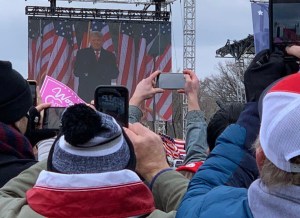This week, Frank Star Comes Out, president of the Oglala Sioux Tribe, announced that the South Dakota tribe had banished Gov. Kristi Noem (R) from its reservation over her remarks on the U.S.-Mexico border last week, including calling the influx of undocumented migrants “an invasion.” There is likely little practical recourse for the governor. However, the decision runs counter to the tribe’s constitution, which includes the protection of free speech. For those of us who view free speech as a human right, the tribe’s decision is fundamentally wrong regardless of how one feels about Gov. Noem’s support for the state of Texas.
Star Comes Out says that banishing the governor is needed for “the safety of the Oyate.” However, he primarily identifies her speech as the basis for saying that her presence on the reservation would endanger members. He stresses “calling the United States’ southern border in Texas an ‘invasion’ by illegal immigrants and criminal groups to justify sending S.D. National Guard troops there is a red herring that the Oglala Sioux Tribe doesn’t support.” He also cites the governor’s pledge to send razor wire to help Texas secure its border.
He also accuses Noem of trying to “create a bogus border crisis just to help Trump get re-elected as President and Governor Noem his running mate as Vice-President.”
Tribal status should not insulate the decision from criticism. Once again, this has nothing to do with the merits of Gov. Noem’s comments or policies. There are good faith reasons to oppose those actions for those who are against more stringent efforts to secure the border. Indeed, the tribal president makes that case. The question is why the tribe feels the need to ban those who hold opposing views.
The Oglala Sioux Tribe expressly protects free speech under Article XII, Section b.
If Noem is violating state law by sending razor wire (which is unlikely), she can be sued. However, the thrust of the letter seems to be her view of the border crisis and calls for greater protections against the influx of migrants. If that is the standard for the tribe, the list of the banished would have to include not only thousands of elected officials but a majority of the country, according to polls.
I have written that I do not believe that this is an “invasion” under Article I, Section 10, Clause 3 of the Constitution. In that sense, I disagree with Gov. Noem. However, many refer to this massive migration as an invasion in the colloquial sense. I can understand why some find that offensive, but it is part of this debate and should be treated as protected not just under the federal but the tribal constitution.
Notably, in 1972, the United States Commission of Civil Rights addressed free speech rights among the tribes in a handbook on civil rights and noted:
“The inclusion of free speech, press, and assembly in the Indian Bill of Rights has caused many tribal spokesmen to complain that these principles are not part of traditional Indian culture and should not be applied to Indian society. They have argued that tribes are not ordinary governments, but are close-knit, family-like groups, and that the exercise of free speech in this atmosphere would lead to the disruption of discipline and the breakdown of tribal life.”
To its credit, the Oglala Sioux Tribe embraced free speech as a core right. Conversely, the ACLU and other groups have supported Sioux tribes in asserting their own free speech rights to protest over the years. Indeed, the Tribe opposed Noem’s push for a “riot boosting” provision to enhance civil and criminal penalties for individuals who supported any “incitement to riot” in the midst of the pipeline protests. I shared those concerns over free speech. Ultimately, tribal advocates celebrated the watering down of that language as a free speech victory.
The letter of Star Comes Out is part of this tradition by speaking out strongly against statements that the tribe finds offensive. It was only the effort to bar Noem for expressing her opposing views on the reservation that is so problematic. For many of us, this is not a federal or tribal right but a human right. As such, the Oglala Sioux Tribe should reverse its decision to banish Gov. Noem.




